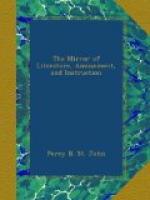senses, the more refined appetites are considered.
In some clubs, the “Travellers” for instance,
a library is provided; and at most of them, even the
most unintellectual, a library of reference is supplied.
Here all the periodicals of the day are laid upon
the tables—both those of Great Britain and
of the continent, together with the newspapers, metropolitan
and provincial, and in some instances the political
journals of Paris. This part of the house may
be considered the general resort of the gossippers
and quidnuncs; and here, or in other more commodious
places, materials for writing, paper, pens, lights,
&c. are found. Drawing-rooms, one or more, are
next to be mentioned—here the members take
their tea or their ease; and where cards are played,
this is the scene of operation. A billiard-room
is an agreeable addition to the accommodation of the
society’s house, and several of the inferior
apartments are always devoted to serve as dressing-rooms.
It is clear, that a bachelor wants nothing beyond
this but a bed; if he chooses to live in this sort
of public privacy he may; and should he be only a
sojourner in town, the convenience of a resort of
this kind wherein he may make his appointments, receive
and write his letters, see society, take his dinner,
spend his evening, if not otherwise engaged, over the
books, the newspapers, or a rubber of whist, and do
all but sleep—a bed in the neighbourhood
may supply the article of repose.—Thus all
physical wants, and many social ones, are abundantly,
and even luxuriously supplied.—
London
Magazine.
[While upon “clubs,” we may as well advert
to the prospectus of “The Literary Club,”
which has reached us since our last. It professes
to be “associated for the assistance
of men of letters, the development of talent, and
the furtherance of the interests of literature.”
It not only aims at charitable provision for
the weaknesses and infirmities of nature, but anticipates
“harmony and friendship” among literary
men, and “as little as possible on any system
of exclusion.” This is as it should be;
but we fear the workings and conflicts of passion and
interest are still too strong to admit of such harmony
among the sons of genius. Authorship is becoming,
if not already become, too much of a trade or craft
to admit of such a pacificatory scheme: but the
object of the association is one of the highest importance
to literature, and we heartily wish it success.—ED.
MIRROR.]
* * * *
*
ENGLISH AND FRENCH.




